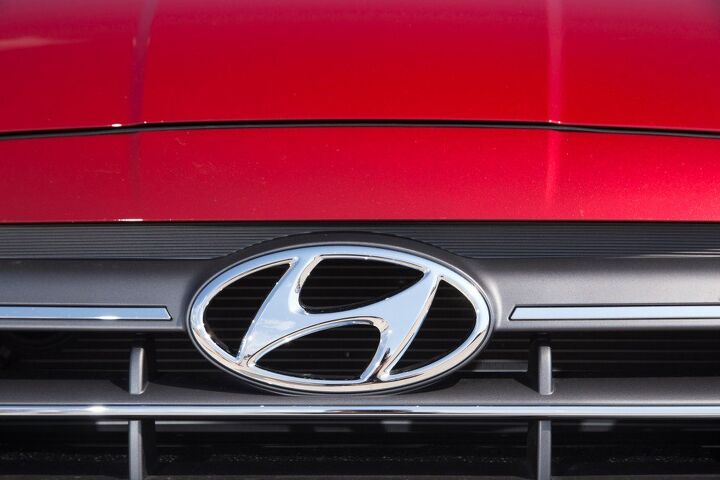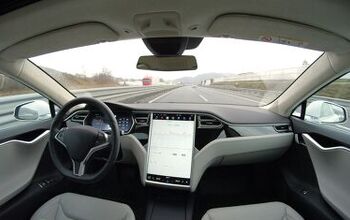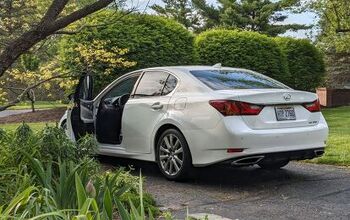Hyundai Gets Real About Autonomous Cars

Automakers have begun leveling with us about vehicular autonomy. After years of promises that self-driving cars were just around the corner, the vision rollback has begun. Testing has taken longer than anticipated and nobody is as close to unleashing a commercial product as they hoped to be. Waymo’s self-driving taxis are arguably the closest, but they’re still dependent upon human safety drivers. They also don’t stray far from areas of operation that have been repeatedly mapped and deemed safe.
While nobody has given up on the technology, claims are becoming less lofty. Realism is creeping into press releases and interviews, resulting in a more complicated pathway to autonomy. Hyundai Motor Group’s heir apparent, Vice Chairman Chung Eui-sun, recently announced the creation of a $4 billion self-driving joint venture with Aptiv, but the plan is more modest than what we’ve become accustomed to.
Despite contributing $1.6 billion in cash and loads of research and development assets, there’s no plan for the JV to focus on anything other than developing reliable automated driving systems. While Hyundai said the technology could eventually be used for self-driving fleets, the primary goal is delivering a fully realized self-driving platform.
Following the joint venture announcement, Chung immediately sat down to answer questions about the automaker’s technological goals — with a minimum of hyperbole.
“We’re still going through a lot of trial and error in terms of the regulations that are coming in place. It’s not about showing off your technology. We want to make things more convenient and safe. That’s why it can’t be just one single company owning all of this technology, it has to be all players within the ecosystem,” Chung told Bloomberg in an interview.
“What’s important is: Can you meet regulations set by the government and standards set by insurance companies? That’s why this isn’t going to happen quickly and will take some time. If you think about level four or five technology, achieving that in a city like Delhi in India is different from achieving that in Palo Alto, Calif. So we want to make sure that we achieve level four or five in a city like Delhi. That’s our ultimate goal. That’s why there’s still a long way to go.”
While Chung gave a loose timeline for when these vehicles would be eligible for production, the goal is to have something ready for market in 2022. However, he hinted that introductory models would likely be prohibitively expensive.
“The technology is costly, and therefore, perhaps by 2022, we won’t be able to lower the price of these vehicles as much as customers would like,” he explained. “But we will want to apply these technologies to a variety of models, whether it’s electric vehicles or combustion engine models or diesel. And through that process, we will be able to make the effort to lower the cost.”
Hyundai sees any fruit born of the Aptiv partnership being used, at least initially, for corporate fleets. It would rather sell the technology and hardware then try to run a side business of its own, a tactic that’s gradually becoming the industry norm. While some automakers have continued to promise self-driving fleets of their own (General Motors, for example) others have becoming increasingly focused on furnishing the technology for future business partnerships (Toyota).
Some argue the difference comes down to a lack of progress. Firms like GM and Waymo were leading the autonomous charge while the likes of Toyota and Hyundai were still in the early testing phases. But that doesn’t necessarily mean they’ve taken the right path. Industry leaders are having to confront the hard issues first. Regulatory hurdles forced General Motors to reevaluate planned functions of the self-driving Cruise AV while developmental issues seem to have slowed progress a bit. Meanwhile, every misstep Waymo’s autonomous vehicles make on public roads ends up on YouTube or in a news article. Even accidents in which an AV is not at fault makes headlines, putting additional pressures on any company in the latter stages of development.
Ultimately, this has encouraged the industry to focus less on autonomy and more on connectivity. Keeping a car permanently linked to the internet opens up the door for data acquisition and established forms of monetization that just need to be adapted for automobiles. Here, Hyundai is no different than any other automaker. It already plans to spend around $12 billion in future growth projects — which encompasses autonomous driving tech, automotive connectivity, and electric vehicles.
Hyundai’s official goals still involve mass producing AVs by 2024. As Aptiv has taken a leading role in the technology’s development, that may yet be feasible, but nobody at Hyundai is interested in making lofty promises.
[Image: Emirhankaramuk/Shutterstock]

A staunch consumer advocate tracking industry trends and regulation. Before joining TTAC, Matt spent a decade working for marketing and research firms based in NYC. Clients included several of the world’s largest automakers, global tire brands, and aftermarket part suppliers. Dissatisfied with the corporate world and resentful of having to wear suits everyday, he pivoted to writing about cars. Since then, that man has become an ardent supporter of the right-to-repair movement, been interviewed on the auto industry by national radio broadcasts, driven more rental cars than anyone ever should, participated in amateur rallying events, and received the requisite minimum training as sanctioned by the SCCA. Handy with a wrench, Matt grew up surrounded by Detroit auto workers and managed to get a pizza delivery job before he was legally eligible. He later found himself driving box trucks through Manhattan, guaranteeing future sympathy for actual truckers. He continues to conduct research pertaining to the automotive sector as an independent contractor and has since moved back to his native Michigan, closer to where the cars are born. A contrarian, Matt claims to prefer understeer — stating that front and all-wheel drive vehicles cater best to his driving style.
More by Matt Posky
Latest Car Reviews
Read moreLatest Product Reviews
Read moreRecent Comments
- Ravenuer Not into F1. Started watching NASCAR back when they raced actual cars. (yeah I'm that old). Not any more. They aren't "stock cars" now. Not even close. Even drag races don't interest me anymore. Races are over in 3 seconds.
- Wjtinfwb No confusion on my end, Ghost. The Government has zero role in job creation outside of the legitimate opportunities' created by Government going about it's responsibilities, namely keeping the American people and territory safe from foreign intrusion. Of course, they're failing epically at that but that's a different topic. The American free enterprise system is what enables job creation. Government's role is to stay out of the way of that system, but they seem incapable of doing so. Oil & Gas exploration is just one example. If a National Job Policy is what you're looking for, there are other countries that will be happy to accept your application for residency.
- Michael Smith I drive 100-300 miles a day in new BMWs, Mercedes-Benzes, and GM SUVs. Some are already equipped with automatic braking.It's the first thing I turn off when I start the car.I've had experiences where (as the author notes) the system gave false alarms and stabbed the brake pedal, threatening my ability to control the car.Further, every driver encounters situations where, for example, legal following distance must be momentarily compromised in order to avoid a difficult situation. When the system intervenes, it disrupts the driver's plan of action. This can lead to a collision as the driver has to suddenly react not to his surroundings, but to the system.Not only is automatic braking an insult to skilled drivers, it's dangerous to everyone.
- Dave M. My hipster daughter is greatly into it. We watched the race together this weekend. It was interesting but I'm not devoted to it like she is. She'll be at the Austin race in October.
- Bd2 I'll watch F1 when Kia and/or Hyundai pony (pun intended) up the cash to field a class leading team. Hyundai is leading many series with the Elantra N with it's incredible 350HP Smartstream-R engine.


































Comments
Join the conversation
by the time autonomous cars are 100% ready to be street legal, all the key patents will have expired. Common for long lag time between creating tech breakthroughs and getting the kinks worked out on the commercialization side. I think sliced bread was the exception.
Doc's won't let me drive after same medical problems last week. I really, REALLY want AVs on the road soon. I didn't realize how much I valued autonomy until I lost it.